The ISFJ Personality Type and the Enneagram
So you’ve taken the MBTI® and you’ve learned that you’re an ISFJ. That’s great! Now you know a little bit about how you experience the world around you and make decisions.
But you keep meeting ISFJs who are very different from yourself. How can this be?
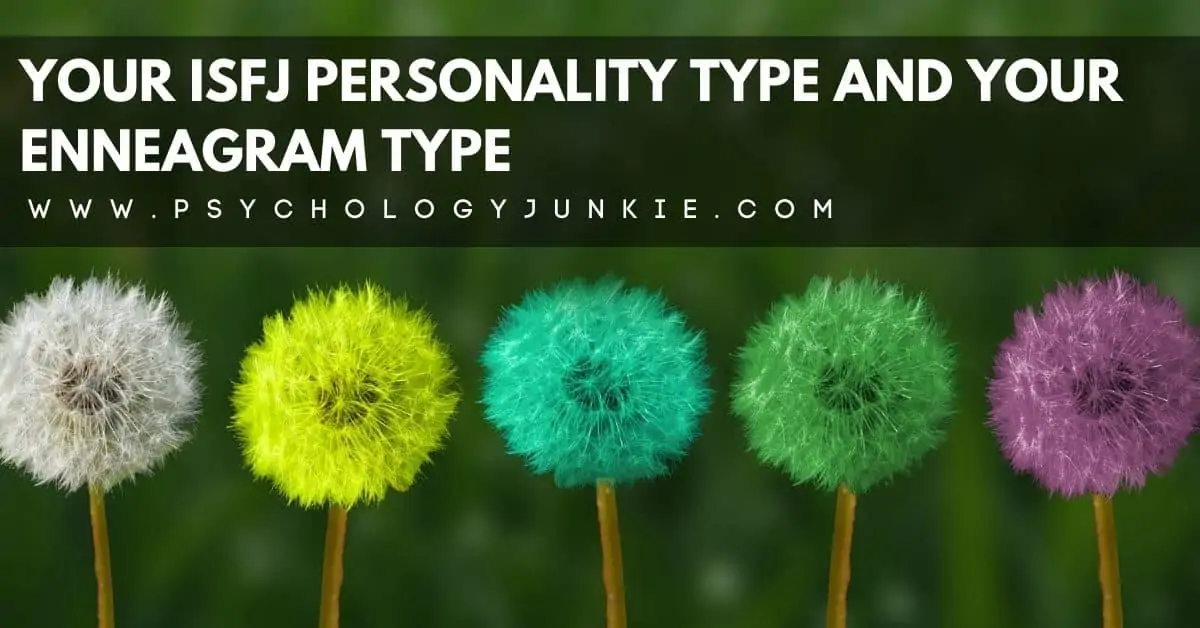
Well, as with all typology systems, the MBTI® can only tell us a fraction about who you are. Your life experiences, education, cultural influences, and Enneagram type can all make a difference. Myers-Briggs is just one factor in your identity, and the Enneagram is yet another factor. An ISFJ 2 will look a lot different from an ISFJ 5.
Today we’re going to look at how you can show up differently as an ISFJ, based on your Enneagram type. I hope you’ll enjoy this and that it will unveil a deeper layer of understanding about who you are and how you approach life.
This article contains affiliate links to books on Amazon. If you purchase one of these books, I get a small kickback that I can use to pay for hosting and other demands of this site. I only recommend books I love.
Table of contents
- The Nine Enneagram Types and the ISFJ
- The ISFJ One Enneagram Type
- The ISFJ Two Enneagram Type
- The ISFJ Three Enneagram Type
- The ISFJ Four Enneagram Type
- The ISFJ Five Enneagram Type
- The ISFJ Six Enneagram Type
- The ISFJ Seven Enneagram Type
- The ISFJ Eight Enneagram Type
- The ISFJ Nine Enneagram Type
- Other Articles You Might Enjoy:
Estimated reading time: 17 minutes
The Nine Enneagram Types and the ISFJ
The ISFJ One Enneagram Type
Core Fear: Being corrupt, bad, or defective
Core Desire: Being good and having integrity
ISFJ Ones have an endless yearning to be the best version of themselves they can possibly be. Yet it’s not because they need a lot of esteem or attention, it’s because they have high standards and want to escape the fear of being corrupt or evil. These ISFJs have a strong moral code and a sense of what is “correct” or “incorrect” in life. They can seem a little less soft, easy-going, and warm than other ISFJs and more disciplined, judicious, and perfectionistic. They usually have a sense that things are supposed to be done a certain way, and they can get irritated and stressed when people try to accomplish tasks in ways that are new or different from their own way.
These ISFJs value fairness and justice a great deal. They likely have strong moral stances on how the world should be run and may speak out against injustice or corruption on their social media accounts or in other ways. To live a good life and to stand up for what’s right even against opposition is paramount to their identity. In fact, some people call Ones the “Champions of Good.”
Unfortunately, ISFJ Ones can be very hard on themselves. They often have an inner critical voice that puts them down, or harshly criticizes themselves or others. Many ISFJs respect this voice rather than calling it what it is: a bully. The healthier the One is, the more they’re able to distance themselves for this voice and accept themselves as they are “warts and all.” They know perfection isn’t possible and while they still try to live with integrity, they are less perfectionistic, judgmental, and self-righteous (or self-condemning).
Because Ones are in the Instinct/Body triad of the Enneagram, they experience a lot of instinctive anger. Yet they attempt to repress it. They feel that it’s a “bad” emotion to express, and their core fear is being bad. Instead, their anger slips out in critical comments, judgmental remarks, or physical tension like a tight jaw or clenched fists.
Unhealthy Ones Can Be: Judgmental, Self-Righteous, Bitter, Overworked, Defensive, and Prone to Black-and-White Thinking. They are often overwhelmed by a nagging fear that they will never be “good enough.”
Average Ones Can Be: Serious, Driven, Purposeful, Irritable, Scheduled, Organized, Tense, Opinionated, Sarcastic, Hard-Working, Dedicated, Responsible.
Healthy Ones Can Be: Sensible, Grounded, Understanding, Objective, Accepting, Hopeful, Wise, Discerning, Joyful, Humble, Playful.
The ISFJ Two Enneagram Type
Core Fear: Of being unloved, worthless, or unwanted.
Core Desire: To know they are loved.
The Two is a fairly common Enneagram type for ISFJs, and it’s not hard to see why. ISFJs are known for being empathetic, generous, and concerned for the welfare of others. Average to healthy Twos are known for the same things. Twos are warm and emotionally in tune with the world around them. They perceive others’ needs and emotions and work to accommodate those on a regular basis. Feelings matter to Twos, and they matter to ISFJs, so ISFJ Twos are deeply concerned with how people feel, why people feel the way they do, and how they can improve people’s feelings and honor them.
The struggle for ISFJ Twos is often that others don’t prioritize their feelings and relationships as much as they do. They can wind up feeling taken for granted, used, or exhausted by caring as deeply as they do. If they are unhealthy, ISFJ Twos may be manipulative rather than generous; giving only to get something in return and playing victim in order to gain sympathy or attention. However, healthy Twos are caring without an ulterior motive. They’ve learned to prioritize their own needs and respect themselves as much as they prioritize and care for others. Thus they are happier, healthier, and more balanced than unhealthy Twos are.
In childhood, ISFJ Twos were taught to put others’ before themselves. And while this is certainly a good lesson, they usually took it too far. It became difficult for them to set healthy boundaries, and they often believed that they had to earn the affection of others through acts of service. Tapping into their feeling side, they learned to read others’ emotions and prioritize them above their own. They hoped by being responsible, generous members of the family, they would earn their place (and the love of their family).
Because Twos are in the Heart triad of the Enneagram, they experience a lot of underlying issues with shame. They worry that if they stop serving and giving that they will lose their relationships or be worthless. On the flipside, they may experience pride because they think that others wouldn’t be able to make it without them.
Unhealthy Twos Can Be: Desperate, Attention-seeking, Victim-Minded, Overbearing, People-Pleasing, Manipulative, Over-worked, Hurt, Exhausted, Insecure, Prideful.
Average Twos Can Be: Selfless, Proud, Well-Intentioned, Complimentary, Supportive, Helpful, Nurturing Flattering, Insecure, Responsible, Possessive.
Healthy Twos Can Be: Generous, Compassionate, Expressive, Self-accepting, Joyful, Humble, Imaginative, Creative, Supportive, Insightful. They prioritize themselves rather than always putting others first.
The ISFJ Three Enneagram Type
Core Fear: Of being worthless without success or achievement.
Core Desire: To feel desired, successful, and accepted.
The ISFJ Three is focused on success and is anxious to achieve the highest honors in all areas of life. These ISFJs easily read the room around them and sense how people are feeling, what people want, or what body language is revealing about a person. They know how to work with these cues and give people what they want; charm, humor, and charisma usually come easy to them as they can alter how they interact based on the cues they’re getting from the other person.
This ISFJ may seem more “Type A” than other ISFJs, because their hunger for excellence pushes them to work hard and keep moving. They have big goals and dreams and aren’t afraid to work hard to make those dreams become a reality. At the same time, they crave stability and comfort. As ISFJs they will be more aware of their body’s physical needs and are less likely than Threes with other personality types to work themselves to the point of physical burnout. That said, they can often feel like there’s endless levels of success and excellence they have yet to reach. Over time, if they can’t learn to reflect, rest, and tune into themselves, they can become insecure about their true worth and play games or exaggerate in order to feel accepted.
In childhood, ISFJ Threes often felt unvalued for who they were. There was a sense that only by winning or achieving would they be valued or truly loved. Any form of praise lifted their spirits, and they found themselves anxiously trying to achieve and strive harder in order to keep that validation coming in. On the outside, ISFJ Threes may look materialistic. They prioritize having the right look, the right credentials, or the right house, car, or wardrobe. They worry that without these tokens of success they will be a failure or empty inside. Ideally as they mature through life, they learn the importance of curating integrity rather than material items.
Because Threes are in the Heart triad of the Enneagram, they tend to experience a lot of issues with shame. Yet unlike the Two or Four, Threes are more out of touch with their feelings and their own desires. As ISFJs, they are highly attuned to others’ feelings but are less conscious of their own. The goal is to succeed, to strive, to achieve. Reflecting on their own emotions becomes a “waste of time” to them until they reach a healthy level of maturity.
Unhealthy Threes Can Be: Arrogant, Insecure, Depressed, Empty, Angry, Attention-Seeking, Confused, Vain, Deceitful, Competitive, Burned-Out, Guarded.
Average Threes Can Be: Over-Achievers, Arrogant, Ambitious, Self-Doubting, Self-Promoting, Competitive, Hard-Working, Creative, Visionary, Determined, Restless.
Healthy Threes Can Be: Imaginative, Confident, Creative, Inspiring, Genuine, Self-accepting, Benevolent, Visionary, Insightful, and/or Empathetic. These threes explore their true identity and discover what they actually want rather than what society labels as “success.”
The ISFJ Four Enneagram Type
Core Fear: Being insignificant without identity.
Core Desire: To find their significance and unique identity.
ISFJ Fours are deep, introspective, and emotionally in tune with themselves. Often melancholy and thoughtful, they desire to be understood and to find their personal significance in the world. With these ISFJs, there’s a sense that’s something missing deep within their soul. They yearn for a missing piece that will complete them; seeking a friend, a source of inspiration, a partner, or a family that might offer this missing piece. As one of the types in the shame/heart triad, ISFJ Fours are aware of their deficiencies. Rather than ignoring them, they are in tune with their shame. In fact, they’re more likely to see what’s wrong with them than what’s right in many cases. Yet they bring to the world a sense of authenticity, creativity, and depth that is very much needed.
ISFJ Fours are more in tune with their own emotions than typical ISFJs. They also appear more stereotypically introverted and aloof. Their emotional range is nuanced and deep and they love anything creative. They often have little pleasing rituals that inspire them, from making a specific type of tea to taking a walk in the woods a certain day out of every week. Organizing their lives around these pleasing routines helps them to feel stable, in touch with their feelings, and creative.
Unhealthy Fours Can Be: Self-destructive, depressed, unrealistic, self-loathing, self-sabotaging, wasteful, apathetic, exhausted, listless, envious, and/or lost in fantasies.
Average Fours Can Be: Imaginative, self-conscious, melancholy, envious, introspective, aesthetically motivated, self-absorbed, sensitive, empathetic, and/or visionary.
Healthy Fours Can Be: Creative, eloquent, imaginative, insightful, authentic, honest, forgiving, revealing, empathic, accepting, and grateful. They don’t feel a need to be different – they know that there is only one of them and they are good as they are.
The ISFJ Five Enneagram Type
Core Fear: Being helpless, incompetent, or overwhelmed.
Core Desire: To be competent and capable.
The Five is a fairly rare type for ISFJs to identify with, but it does happen from time to time. ISFJ Fives are more detached, aloof, and analytical than the typical ISFJ. They hope that by gathering enough data and knowledge they’ll be able to go out into the world feeling secure and competent. Yet, for the average to unhealthy Five, the information never seems to be comprehensive enough. There’s a constant hunger for more information and more knowledge yet a fear around actually using that information in the real world.
ISFJ Fives feel a push and pull between wanting to connect with others (through Extraverted Feeling) and pull away (due to their Five nature). Fives are afraid of becoming overwhelmed by others, and so they often keep to themselves or hoard objects that replenish their energy. ISFJ Fives, in particular, surround themselves with “creature comforts” (economically-priced ones) that can give them a sense of security.
These ISFJs will seem less driven by their feelings and more driven by an analytical desire to know truth and understand the inner workings of the world around them. They are deeply in touch with their tertiary function, Introverted Thinking, and may struggle with having Si-Ti loops where they become disconnected from their auxiliary Feeling process.
In childhood, ISFJ Fives often felt that they weren’t secure in some way. This safety may not have been related to child abuse or anything extreme. They could have felt emotionally overwhelmed by their families or without structure or predictability. Because of this nagging sensation, they retreated into whatever private space they could find. In solitude, they wouldn’t have to worry about being overwhelmed by people’s unpredictability or emotional space. In private they could absorb books, enjoy pleasing routines, organize their space for their maximum comfort, and learn about whatever subject sparked their interest.
Fives are in the Head/Fear triad of the Enneagram. They tend to cope with their fear by withdrawing and gathering data. The more they know, the more they believe they can face their fears with competence.
Unhealthy Fives Can Be: Aloof, eccentric, insomniacs, stuck in analysis-paralysis, afraid, reclusive, secretive, under-nourished, fearful, argumentative, and/or removed from their feelings.
Average Fives Can Be: Insecure, high-strung, cerebral, secretive, private, skeptical, resentful, imaginative, creative, private, pre-occupied, conceptual, observant, and/or intelligent.
Healthy Fives Can Be: Competent, strong, profound, curious, original, artistic, inventive, original, independent, clear-minded, engaged, grounded, compassionate, perceptive, and/or productive.
The ISFJ Six Enneagram Type
Core Fear: To be abandoned and without support
Core Desire: To find security and support
The Six is one of the most common Enneagram types for the ISFJ. Sixes, like ISFJs, love security and want to feel that they’re part of a stable community. Loyal and hard-working, they generously serve the people they love and strive to be of service. People appreciate their dutiful nature, their attention to detail, and their often quirky sense of humor. While at first glance these ISFJs may seem to be accepting of authority and the rules of their community, they do have a rebellious side that can vary in strength. Some Sixes are very skeptical of authority and will outright test them to see if they are incorruptible. Other Sixes are respectful to authority and may follow the rules, but secretly be plagued by doubt and skepticism.
The ISFJ Six is constantly assessing the horizon for potential risks. They tend to be worriers, and their imaginations can run wild with worst-case scenarios. You’ll often see them preparing for something that could go wrong, vigilantly creating contingency plans and double-checking the locks on their doors.
Because Sixes are in the Head/Fear triad, they struggle with underlying issues with anxiety. They have difficulty trusting their own minds and they look outside themselves for rules, communities, or authorities that feel unshakable. This is difficult for them, however, because they are also afraid of trusting in anything or anyone that might let them down. Because of this, especially at average to unhealthy levels, they feel permanently insecure. Once Sixes reach healthy maturity they learn to trust their instincts and form lasting bonds and relationships with others.
Unhealthy Sixes Can Be: Plagued by guilt, delusional, self-punishing, self-destructive, paranoid, insecure, obsessed with fears, panicky, testy, helpless, and depressed.
Average Sixes Can Be: Supportive, indecisive, authority-seeking, authority-questioning, anxious, pessimistic, cautious, impulsive, skeptical, cynical, dutiful, and/or hard-working.
Healthy Sixes Can Be: Responsible, grounded, committed, practical, well-disciplined, insightful, visionary, friendly, trustworthy, hard-working, serene, and brave.
The ISFJ Seven Enneagram Type
Core Fear: Of being in pain or deprived.
Core Desire: To be happy, satisfied, and have their needs fulfilled.
Adventurous and fun-loving, ISFJ Sevens defy many of the stereotypes of ISFJs. While they still like having a general routine and sense of stability, they’re more comfortable with newness and spontaneity. These ISFJs like to find the fun in any situation and stay positive when life gets depressing or dull. The downside to this is that they can avoid dealing with negative emotions by constantly distracting themselves with comforting routines, tv shows, movies, or activities that get them out of their head. Over time this can lead to a lot of repressed emotions that bubble up later in unhealthy ways. Many ISFJs relate to the Social or Self-Preservation subtypes than the other subtype of the Seven. Social ISFJ Sevens are dedicated, thrifty, responsible, and helpful. While they have the fun-loving, possibility-seeking nature of the Seven, they appear more dutiful and focused. Self-preservation ISFJ Sevens are extremely pragmatic, grounded, and community-oriented. They enjoy collecting people to spend time with and lean on for support as well as support in turn.
In childhood, Sevens often felt a gap between themselves and the nurturing figure in their life (often the mother, but not always). Instead, they sought nurturance through distractions: toys, games, activity, or laughter. Even into adulthood, Sevens look for objects and distractions to help them repress feelings of separation, hurt, and pain. The gap that Sevens feel between themselves and their mother may not have been caused by anything intentional or extreme. As an example, another baby might have been born and needed more attention than the young Seven was comfortable with.
Sevens are in the Fear/Head triad of the Enneagram. While Sixes look for security to assuage their fears, Sevens try to distract themselves from their fears through activity and positivity.
Unhealthy Sevens Can Be: Escapists, Hedonistic, Childish, Joyless, Reckless, Scattered, Unstable, Overwhelmed, Attention-Seeking, Impulsive, Paralyzed.
Average Sevens Can Be: Impatient, Imaginative, Enthusiastic, Excessive, Creative, Distracted, Adventurous, Materialistic, Restless, Self-Centered, Skilled at Multi-Tasking.
Healthy Sevens Can Be: Satisfied, Grounded, Bold, Realistic, Charismatic, Visionary, Appreciative, Joyful, Helpful, Profound.
The ISFJ Eight Enneagram Type
Core Fear: Being controlled or violated.
Core Desire: To determine their own course in life. To protect themselves.
Eight is probably the rarest Enneagram type for the ISFJ personality type. Assertive and charismatic, ISFJs who identify with this Enneatype are far from the cautious, soft-spoken descriptions common for ISFJs. In childhood, Eights believed that they had to take care of themselves because their authorities were incompetent in some way. They hate the idea of being controlled by anyone and can be defensive because of this – on alert for anyone who might try to wrestle control of their life.
ISFJ Eights will appear more socially aware and people-oriented than most Eights. They believe in protecting the underdogs, defending justice, and speaking out against things that might harm the people they care about. They detest anyone who exploits or bullies a vulnerable person and can be quite intense and confrontational in defense of the people they love. They are far more comfortable with confrontation than most ISFJs, believing that conflict is sometimes the most effective way to reach harmony on the other side. ISFJs identify with the Social Eight type more than the other two subtypes of Eight. This is because social Eights are typically service-minded, loyal, friendly, and generous-natured – qualities that are more typical of the average to healthy ISFJ.
Eights are in the Body/Anger triad of the Enneagram. They express their anger outwardly. However, they are more emotionally in tune with others and aware of which buttons their pressing, rather than tactlessly exploding on people without knowing how they’re impacting people.
Unhealthy Eights Can Be: Destructive, Bossy, Vengeful, High-Tempered, Rejecting, Private, Hardened, Authoritative, and/or Confrontational.
Average Eights Can Be: Resourceful, Businesslike, Competitive, Boastful, Willful, Proud, Bad-tempered, Independent, Hard-Working, Protective and/or Determined.
Healthy Eights Can Be: Courageous, Heroic, Forgiving, Energetic, Independent, Action-Oriented, Resourceful, Direct, Protective, Generous, Inspiring, Strategic, Decisive, Self-Confident, and/or Authentic.
The ISFJ Nine Enneagram Type
Core Fear: Fragmentation, separation, or loss.
Core Desire: To have inner harmony and peace of mind.
Nine is one of the more common Enneagram types for the ISFJ. Empathetic and easygoing, ISFJ Nines enjoy a tranquil life full of harmonious relationships. They see the beauty in everything and can often imbue sentimental meaning in everyday experiences and household objects. Their conscientious, supportive nature makes them a favorite among friends.
ISFJ Nines value comfort and ease, and spend a great deal of time organizing their homes to be havens from conflict or unnecessary hardship. They are often homebodies and enjoy being around familiar people and objects. Routine-oriented and stable, they like to keep their space as “cozy” as possible; surrounding themselves with blankets, candles, teas, or other comforting items that make them feel physically relaxed. Anyone who brings conflict or uproar into their space is likely to get a passive-aggressive comment from them.
In childhood, Nines learned that the best way to handle turmoil in their environment was to “numb out” or emotionally disappear. They learned to dissociate from threatening or disruptive events and make themselves low-maintenance so they wouldn’t bother anyone or make things worse. They felt that if they asserted themselves or became angry they would only create more problems. So they stayed in the background, repressed their feelings, their will, and their desires.
While on the outside ISFJ Nines might seem easy-going and unphased, they often build up a great deal of resentment and anger and eventually they will “snap” if they never learn to channel it in healthy ways. Friends and family members may be shocked when the calm, easy-going ISFJ Nine lashes out unexpectedly once their patience has boiled over.
Unhealthy Nines Can Be: Withdrawn, Ineffectual, Depressed, Unrealistic, Dissociated, Disoriented, Numb, Helpless, Repressed, Neglectful, Lazy, and/or Listless.
Average Nines Can Be: Agreeable, Open-Minded, Disengaged, Compassionate, Amicable, Deflecting, Resigned, Appeasing, Complacent, Dismissive of Pain.
Healthy Nines Can Be: Patient, Level-Headed, Present, Dynamic, Imaginative, Inspiring, Self-Possessed, Serene, Easy-Going, Kind, Patient, Peaceful, Comforting, and/or Spiritual.
Other Articles You Might Enjoy:
Confessions of an Unhealthy ISFJ
10 Characteristics of the ISFJ Child
What Are Your Thoughts?
Do you relate to any of these descriptions or Enneatypes? Which one fits you best as an ISFJ? Let us (and other readers) know in the comments!
Find out more about your personality type in our eBooks, Discovering You: Unlocking the Power of Personality Type, The INFJ – Understanding the Mystic, The INFP – Understanding the Dreamer, and The INTJ – Understanding the Strategist. You can also connect with me via Facebook, Instagram, or Twitter!
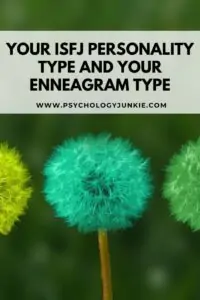




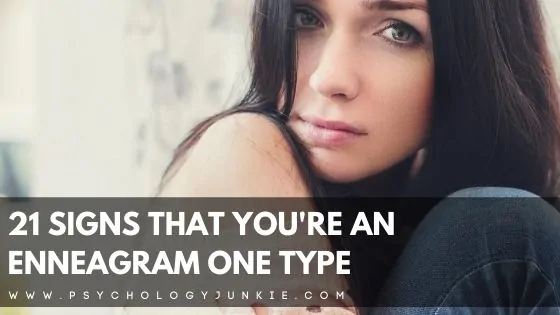
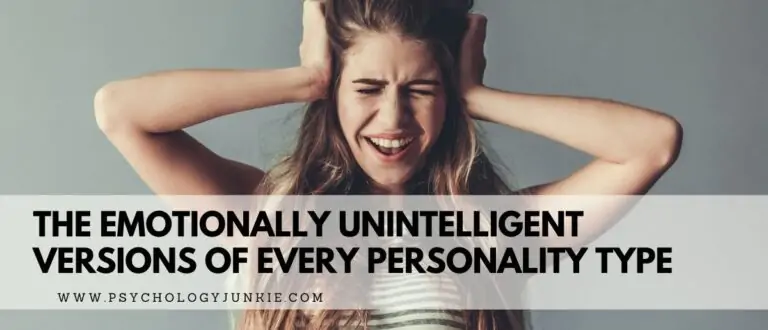

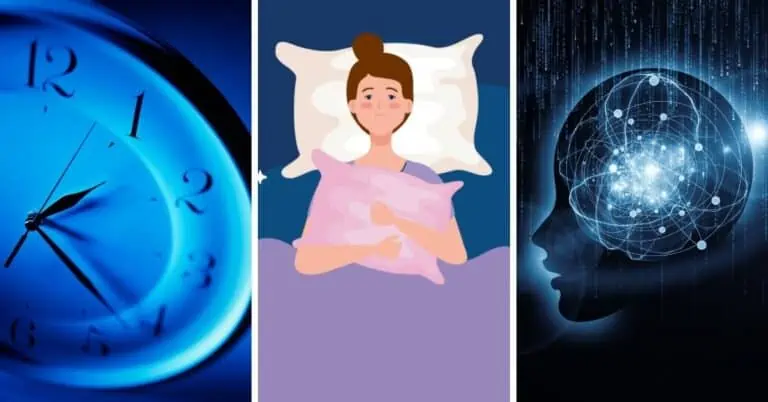
Very interesting articles !!! This is something new. You can have such an article with istj?
Your articles are always so interesting !!! Add an enneagram, this is something new !!!
Please write such an article with ISTJ💕
So true I am an Omnivert, sensing ,feeling, judging, ennagram 9. Closest to ISFJ
This was very interesting and exciting. Could you please make these for the other MBTI types? I’d especially appreciate it as I’m trying to study the impact enneagrams have on MBTI types. I’m unsure of my true MBTI and Enneagram, but it’s narrowed down to ISFP/INFP and 4/6.
pleaseee send intp ،estp ،istp ،estj، istj، esfj too!